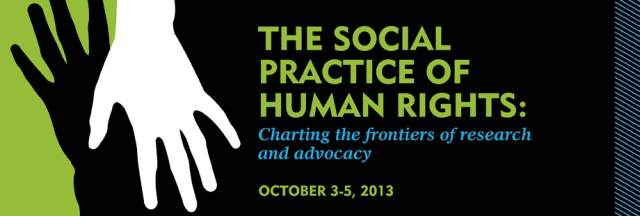Location
River Campus - Room M2265
Start Date
10-4-2013 3:15 PM
Abstract
As the human rights regime has developed throughout history and especially post WWII, new actors have joined in its promotion. These actors have worked toward expanding identities having claims to human rights and how those claims can be conceptualized. This paper will look at two recent emerging identities. The first will be the identity of Indigenous Peoples and how they have redefined human rights engagement by working to create new UN human rights instruments and bodies. The redefinition of human rights issues will also be looked at in the context of the Indigenous Peoples identity. Issues such as the environment, self-determination, and collective rights have all been re-opened for negotiation with the emergence of this identity as an actor in human rights. The second and more recently emerging identity becoming a human rights actor is that of the peasant. Seeming to follow a similar trajectory as the pan-Indigenous movement, the pan-peasant movement is currently negotiating at the UN to create a human rights instrument focusing on the rights of peasants. This has also re-opened debates about issues constituting human rights, particularly food sovereignty and land grabbing. These two emerging actors in human rights have both redefined human rights engagement, and issues that constitute human rights issues. This paper will look at the emergence of both identities to analyze the expansion of human rights actors and how bringing new identities into human rights engagement has re-opened the negotiation on ways to conceptualize human rights issues.
Human Rights and Emerging Actors: Indigenous Peoples and Peasants Redefining the Issues
River Campus - Room M2265
As the human rights regime has developed throughout history and especially post WWII, new actors have joined in its promotion. These actors have worked toward expanding identities having claims to human rights and how those claims can be conceptualized. This paper will look at two recent emerging identities. The first will be the identity of Indigenous Peoples and how they have redefined human rights engagement by working to create new UN human rights instruments and bodies. The redefinition of human rights issues will also be looked at in the context of the Indigenous Peoples identity. Issues such as the environment, self-determination, and collective rights have all been re-opened for negotiation with the emergence of this identity as an actor in human rights. The second and more recently emerging identity becoming a human rights actor is that of the peasant. Seeming to follow a similar trajectory as the pan-Indigenous movement, the pan-peasant movement is currently negotiating at the UN to create a human rights instrument focusing on the rights of peasants. This has also re-opened debates about issues constituting human rights, particularly food sovereignty and land grabbing. These two emerging actors in human rights have both redefined human rights engagement, and issues that constitute human rights issues. This paper will look at the emergence of both identities to analyze the expansion of human rights actors and how bringing new identities into human rights engagement has re-opened the negotiation on ways to conceptualize human rights issues.




Comments
This biennial conference provides a unique space for scholars, practitioners and advocates to engage in collaboration, dialogue and critical analysis of human rights advocacy — locally and globally. Learn more about the Human Rights Center at the University of Dayton >>>.